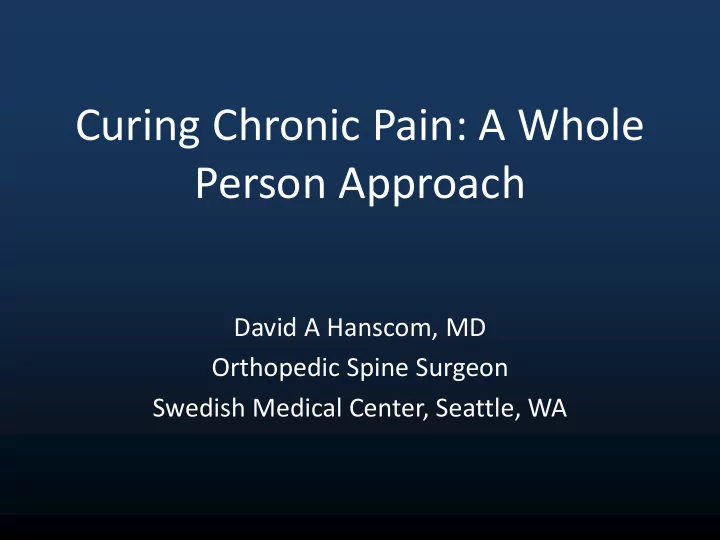

Curing Chronic Pain: A Whole Person Approach David A Hanscom, MD Orthopedic Spine Surgeon Swedish Medical Center, Seattle, WA
“The Junction Box”
Oxytocin Dopamine GABA receptors “Junction Neutral Box” Nervous System Adrenaline CortisoL Endorphins
“There is nothing either good or bad, but thinking makes it so.” ~ William Shakespeare Hamlet , Act 2, Scene 2 The first neuroscientist?
Suffer Mask Suppress
Paradoxical Effects of Thought Suppression Daniel M. Wegner, David J. Schneider, Samuel R. Carter III, and Teri L. White
Why is Chronic Pain So Persistent?
Pain Circuits are Reinforced
Mystery of Phantom Limb Pain
“Rage”
It’s the Adrenaline
Direct diagnosis and management of emotional factors in chronic headache patients • Striated muscle tension • Smooth muscle tension • Cognitive-perceptual disruption • Conversion • Abbass A, et al. Cephalalgia, 2008
Benefits of Anger
Coping with Anxiety
Solving the Unsolvable
Awareness Address all variables Patient takes charge
Awareness
Address All Variables
Variables • Understanding Pain • Sleep • Stress • Meds • Life Outlook • Physical conditioning
Prehab
www.backincontrol.com
62 y/o female with neurogenic claudication
Hunting elk
Patient Takes Control
Write and Rip
Awareness
MARK’S STORY
Awareness Address all variables Patient takes charge
Thank You!
Thank You
A Silent Epidemic 116 million Americans suffer from chronic pain $635 billion is spent each year on treatments that are often ineffective and frequently do more harm than good
The Many Faces of My Neurophysiologic Disorder • Migraines • OCD • Tinnitus • Acid Reflux • Burning feet • Back/neck pain • Anxiety/ panic attacks • Migratory skin rashes • Insomnia • Itching scalp • Severe depression • Tension Headaches • PTSD • Crushing chest pain • Chronic tendonitis • Palpitations
Unresolved Pain Shifts in the Brain Over Time Study reviewed in Brain: A Journal of Neurology
Prospective fMRI Study LBP • Acute pain = 94 – < 2 months • Chronic pain = 59 – > 10 years
Location of brain activity • Acute pain – nociceptive area • Chronic – emotional area
Longitudinally followed 39 acute LBP • 19 recovered • 20 become chronic
Scans every 3 months for 12 months Became Chronic Pain Resolved • Nociceptive area quiet • Activity shifted to emotional centers • Nociceptive quiet
Chronic pain exists in the emotional not the nociceptive areas of the brain
Rita
Behavior is guided by your body’s chemical response to sensory input
Neurological pathways are permanent Strengthen with Repetition
Solution Principles
Awareness Hope Forgiveness Play
Awareness Hope Forgiveness Play
I believe that one of the most basic needs that makes us human is to be in charge of our destiny with a sense of purpose. Successfully treating patients suffering from chronic pain requires re-connecting them with their original sense of vision and purpose in life.
Awareness Hope Forgiveness Play
REACTIVE
CREATIVE
“C” first
Addressing anger is the “Continental Divide” of healing from chronic pain
Awareness Hope Forgiveness Play
Does Rejection Hurt? An fMRI Study of Social Rejection • Science 302, 290 (2003) – Naomi I. Eisenberger, et al.
OMEGA EXPERIENCE
Disease in man is never exactly the same as disease in an experimental animal, for in man the disease at once affects and is affected by what we call the emotional life. Thus the physician who attempts to take care of the patient while he neglects this factor is as unscientific as the investigator who neglects to control all of the conditions that affect his or her experiment.
One of the essential qualities of the clinician is interest in humanity, for the secret of care is in caring for the patient.
Frances Peabody The Care of the Patient - 1927
Awareness Hope Forgiveness Play
Anxiety is a Neurophysiological Response to Sensory Input
Why is Chronic Pain Hard to Treat?
“We propose that chronic pain is the consequence of plastic changes in cortical-limbic circuitry, leading to new learning and to memory formation that are continuously reinforced and thus cannot be extinguished, as a consequence of the emotional and motivational associations with the painful stimulus …….” Mansour 2014
Recommend
More recommend